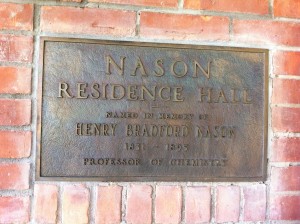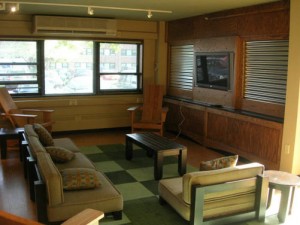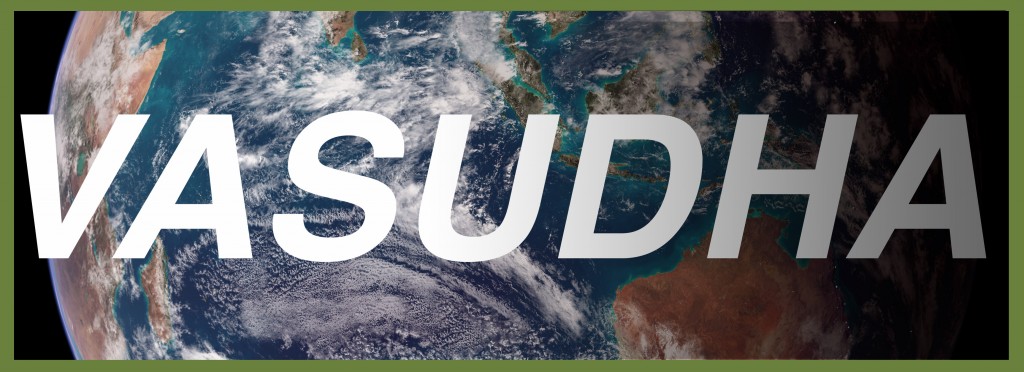Vasudha is a new first-year living & learning community at Rensselaer. Being a living and learning community, students get a chance to study and live with other students who share their interests in the Earth, its environment, and our natural and energy resources. The students who elect to participate in this program will be encouraged (but not required) to enroll in a core seminar, IHSS-1970 Nature/Society, offered during the Fall semester. They will also have other opportunities to take courses related to energy, environment, the earth sciences, and biodiversity, including a dedicated section of Biology with greater attention to nature’s ecology. Similar to the other theme houses, all members of Vasudha will live in a common residence hall—the program is located in Nason Hall—with a dedicated lounge and classroom. The signature themes of the program are a focus on independent thought, critical thinking, and an early introduction to undergraduate research experience.
We also view this as a program that can continue throughout a student’s period of study at Rensselaer, although the residential component is for the first year only. No commitment beyond the first year is necessary. All of the courses students take within the program are applicable towards graduation requirements, either as required courses or as free electives. All students in the program will be making normal progress towards their degree requirements.
A living and learning community at Rensselaer focused on energy, environment, and biodiversity.
 As a first-year student at Rensselaer, you have the option of joining one of several new themed housing units on campus. “Earth, Energy, and Environment—The Vasudha Living & Learning Community” is unique among these communities. It is a living and learning community, where you’ll also have the option of taking one or more courses with other students who share your interests in the Earth, its energy resources, and our natural environment. Similar to other theme houses, you’ll live in a common residence hall—we’re located in Nason Hall—where you’ll enjoy great conversations with others students, and with faculty, in our dedicated lounge and classroom. One of the signature themes of our program is a focus on independent thought, critical thinking, and an early introduction to undergraduate research experience.
As a first-year student at Rensselaer, you have the option of joining one of several new themed housing units on campus. “Earth, Energy, and Environment—The Vasudha Living & Learning Community” is unique among these communities. It is a living and learning community, where you’ll also have the option of taking one or more courses with other students who share your interests in the Earth, its energy resources, and our natural environment. Similar to other theme houses, you’ll live in a common residence hall—we’re located in Nason Hall—where you’ll enjoy great conversations with others students, and with faculty, in our dedicated lounge and classroom. One of the signature themes of our program is a focus on independent thought, critical thinking, and an early introduction to undergraduate research experience.
If you’re intrigued, continue reading! All you have to do is to check off “Earth, Energy, and Environment” under themed housing in the housing selection page of the You’re In website. There’s no obligation to participate: we’ll place you in a lottery, and will contact you to confirm your interest if you’re selected. Or send us a brief statement of interest (use the application form below) for preferred entry into the program
What’s Living and Learning?
Living and learning communities are something you’ll find at many colleges in the United States. It’s a place where you live and learn. You’ll get an opportunity to build strong friendships, even as you develop deeper wisdom and insight in a specific area of study. Because we have a close knit group of faculty members who are affiliated with the program, you’ll also get a chance to know them better. Our instructors are regular members of the Rensselaer faculty who do active research on energy, environment, and/or their relationship to society. With Vasudha, you’ll also find many opportunities to participate in—and organize—extra-curricular programs and activities. While these activities may vary from year to year, they have included field trips to the Darrin Fresh Water Institute, the historic Erie Canal, and the diverse ecosystem of the Rensselaer Plateau. We also sponsor a lecture series each year on topics such as global warming and climate change.
Its not a major… Who’s it for?

The lounge in Nason Hall, the center of the Vasudha Community.
This living & learning community is designed for all new first-year Rensselaer students, as well as second-year students who choose to stay with the program. There is no requirement that you take a Vasudha affiliated course, although we encourage students to take the core seminar, IHSS-1970 Nature/Society, since this will give you an opportunity to connect with other students. In the fall semester, you’ll also have the option of taking a common section of BIOL-1010 Introduction to Biology, with an expanded focus on ecology. Basically, this approach works because we consider Vasudha to be an interdisciplinary program where mechanical engineers, biologists, architects, and others can work together to learn about, and solve the complex problems related to the Earth’s environment. Thus, whether you’re studying Environmental Engineering, Finance, or Communications, or are interested in Law or Medicine, all of the work you do outside of the program contributes to what you learn within it. This is the goal of “integrating” knowledge that stands at the heart of our vision for our living and learning community.
Participating in Vasudha will not interfere with your ability to complete any degree program at Rensselaer within the normal four-year period (five years for Architecture). Most of the courses you take will fulfill institute requirements; most courses you take in your first year will contribute to your defined major.
Course Options
For those who wish to take a “full slate” of Vasudha affiliated courses during their first year, we recommend the following opportunities. (You are also welcome to choose selectively from this list):
IHSS-1970 Nature/Society: A Perspective on Energy, Natural Resources, Climate Change, and Biodiversity
This course will focus on the social, biological and ecological aspects of humans in the natural world. We emphasize critical thinking about where we come from and where we are going. You’ll learn about how we have used the land in the past, what we do today, and what our prospects are as a species in the 21st century. Contemporary issues such as land use, energy supply, climate change, and biodiversity loss will be explored through literature, films, and guest lectures. The course is also organized around a series of field trips, including “virtual” field trips to foreign places that will allow us all to study human habitation in very different ecological settings. Students are expected to participate actively in the class through group projects, presentations, creative writing, and critical discussion of the readings. (4 credits)
BIOL-1010 Introduction to Biology
Real-world problems associated with biological phenomena are utilized in studying and developing literacy in areas of biology to include evolution, ecology, biotechnology, and genetics. The course considers the biological components of various societal and individual problems and is taught in an interactive, studio format. Laboratory exercises include both experimental and simulation experiences that again are related to modern interdisciplinary topics. (4 credits)
A 2000-level Course Related to Contemporary Environmental Issues
During the Spring semester, you will also be offered a set of courses—Environmental Sociology; Sustainable Design; Environmental Engineering; Environment and Development; Alternative Energy Resources, and the like—designed to enhance your understanding of current issues surrounding the environment. Here you’ll also have the opportunity to interact with upper class students who share similar interests, including former Vasudha “graduates.” The specific courses offered each year will vary, based on student interests and availability of instructor. (4 credits)
Undergraduate Research Experience
As a member of the living and learning community, you will also be encouraged to participate in a 2- or 4-credit undergraduate research experience during the spring semester of your first year. This will allow you to pursue independent and guided research on a topic related to the theme of the living and learning community. You may wish to pursue research and independent study from a purely scientific and technological standpoint, examine the social or cultural dimensions of a particular problem, or study the business and economic consequences of environmental issues and its related challenges. (2 or 4 credits)

